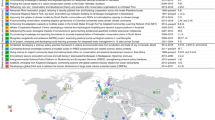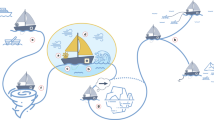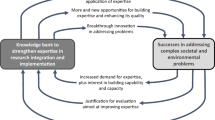Abstract
Research practice, funding agencies and global science organizations suggest that research aimed at addressing sustainability challenges is most effective when ‘co-produced’ by academics and non-academics. Co-production promises to address the complex nature of contemporary sustainability challenges better than more traditional scientific approaches. But definitions of knowledge co-production are diverse and often contradictory. We propose a set of four general principles that underlie high-quality knowledge co-production for sustainability research. Using these principles, we offer practical guidance on how to engage in meaningful co-productive practices, and how to evaluate their quality and success.
This is a preview of subscription content, access via your institution
Access options
Access Nature and 54 other Nature Portfolio journals
Get Nature+, our best-value online-access subscription
$29.99 / 30 days
cancel any time
Subscribe to this journal
Receive 12 digital issues and online access to articles
$119.00 per year
only $9.92 per issue
Buy this article
- Purchase on Springer Link
- Instant access to full article PDF
Prices may be subject to local taxes which are calculated during checkout

Similar content being viewed by others
References
Rockström, J. et al. A safe operating space for humanity. Nature 461, 472–475 (2009).
Raudsepp-Hearne, C. et al. Untangling the environmentalist’s paradox: why is human well-being increasing as ecosystem services degrade? BioScience 60, 576–589 (2010).
Nash, K. L. et al. Planetary boundaries for a blue planet. Nat. Ecol. Evol. 1, 1625–1634 (2017).
Steffen, W. et al. Trajectories of the Earth system in the Anthropocene. Proc. Natl Acad. Sci. USA 115, 8252–8259 (2018).
Cash, D. W. et al. Scale and cross-scale dynamics: governance and information in a multilevel world. Ecol. Soc. 11, 8 (2006).
The best research is produced when researchers and communities work together. Nature 562, 7 (2018).
Weaver, C. P. et al. From global change science to action with social sciences. Nat. Clim. Change 4, 656–659 (2014).
Balvanera, P. et al. Key features for more successful place-based sustainability research on social-ecological systems: a Programme on Ecosystem Change and Society (PECS) perspective. Ecol. Soc. 22, 14 (2017).
Verburg, P. H. et al. Land system science and sustainable development of the earth system: a global land project perspective. Anthropocene 12, 29–41 (2015).
van der Hel, S. New science for global sustainability? The institutionalisation of knowledge co-production in Future Earth. Environ. Sci. Policy 61, 165–175 (2016).
Bremer, S. & Meisch, S. Co-production in climate change research: reviewing different perspectives. Wiley Interdiscip. Rev. Clim. Change 8, e482 (2017).
Lang, D. J. et al. Transdisciplinary research in sustainability science: practice, principles, and challenges. Sustain. Sci. 7, 25–43 (2012).
Pohl, C. & Hadorn, G. H. Frameworks for transdisciplinary research: framework #1. GAIA - Ecol. Perspect. Sci. Soc. 26, 232–232 (2017).
Ferguson, D. B., Masayesva, A., Meadow, A. M. & Crimmins, M. A. Rain gauges to range conditions: collaborative development of a drought information system to support local decision-making. Weather Clim. Soc. 8, 345–359 (2016).
Haraway, D. Situated knowledges: the science question in feminism and the privilege of partial perspective. Fem. Stud. 14, 575–589 (1988).
Tengö, M. et al. Weaving knowledge systems in IPBES, CBD and beyond—lessons learned for sustainability. Curr. Opin. Environ. Sustain. 26–27, 17–25 (2017).
Nielsen, W. et al. Gender diversity leads to better science. Proc. Natl Acad. Sci. USA 114, 1740–1742 (2017).
Greenwood, D. & Levin, M. Introduction to Action Research. Introduction to Action Reasearch (SAGE Publications, 2007).
Pohl, C. et al. Researchers’ roles in knowledge co-production: experience from sustainability research in Kenya, Switzerland, Bolivia and Nepal. Sci. Public Policy 37, 267–281 (2010).
Harvey, B., Cochrane, L. & Van Epp, M. Charting knowledge co‐production pathways in climate and development. Environ. Policy Gov. 29, 107–117 (2019).
Hurlbert, M. & Gupta, J. The split ladder of participation: a diagnostic, strategic, and evaluation tool to assess when participation is necessary. Environ. Sci. Policy 50, 100–113 (2015).
Nel, J. L. et al. Knowledge co-production and boundary work to promote implementation of conservation plans. Conserv. Biol. 30, 176–188 (2016).
Reed, M. S. et al. Who’s in and why? A typology of stakeholder analysis methods for natural resource management. J. Environ. Manag. 90, 1933–1949 (2009).
Bodin, Ö., Crona, B. & Ernstson, H. Social networks in natural resource management: what is there to learn from a structural perspective? Ecol. Soc. 11, r2 (2006).
Brandt, F., Josefsson, J. & Spierenburg, M. Power and politics in stakeholder engagement: farm dweller (in)visibility and conversions to game farming in South Africa. Ecol. Soc. 23, 32 (2018).
Mobjörk, M. Consulting versus participatory transdisciplinarity: a refined classification of transdisciplinary research. Futures 42, 866–873 (2010).
Wittmayer, J. M. & Schäpke, N. Action, research and participation: roles of researchers in sustainability transitions. Sustain. Sci. 9, 483–496 (2014).
Reed, M. S., Stringer, L. C., Fazey, I., Evely, A. C. & Kruijsen, J. H. J. Five principles for the practice of knowledge exchange in environmental management. J. Environ. Manag. 146, 337–345 (2014).
Gaventa, J. Finding the spaces for change: a power analysis. IDS Bull. 37, 23–33 (2006).
Popa, F., Guillermin, M. & Dedeurwaerdere, T. A pragmatist approach to transdisciplinarity in sustainability research: from complex systems theory to reflexive science. Futures 65, 45–56 (2015).
Polk, M. Transdisciplinary co-production: designing and testing a transdisciplinary research framework for societal problem solving. Futures 65, 110–122 (2015).
Bednarek, A. T. et al. Boundary spanning at the science–policy interface: the practitioners’ perspectives. Sustain. Sci. 13, 1175–1183 (2018).
Cvitanovic, C., Löf, M. F., Norström, A. V. & Reed, M. S. Building university-based boundary organisations that facilitate impacts on environmental policy and practice. PLOS ONE 13, e0203752 (2018).
Hahn, T., Olsson, P., Folke, C. & Johansson, K. Trust-building, knowledge generation and organizational innovations: the role of a bridging organization for adaptive comanagement of a wetland landscape around Kristianstad, Sweden. Hum. Ecol. 34, 573–592 (2006).
Miller, T. R. et al. The future of sustainability science: a solutions-oriented research agenda. Sustain. Sci. 9, 239–246 (2014).
Wiek, A. Challenges of transdisciplinary research as interactive knowledge generation – experiences from transdisciplinary case study research. GAIA - Ecol. Perspect. Sci. Soc. 16, 52–57 (2007).
Leach, M. et al. Local disease–ecosystem–livelihood dynamics: reflections from comparative case studies in. Africa. Philos. Trans. Royal Soc. B 372, 20160163 (2017).
Earl, S., Carden, F. & Smutylo, T. Outcome Mapping: Building Learning and Reflection into Development Programs (IDRC, 2001).
Moser, S. C. Can science on transformation transform science? Lessons from co-design. Curr. Opin. Environ. Sustain. 20, 106–115 (2016).
Wiesmann, U. et al. in Handbook of Transdisciplinary Research (eds Hadorn, G. H. et al.) 433–441 (Springer, 2008).
Leach, M., Stirling, A. C. & Scoones, I. C. Dynamic Sustainabilities (Routledge, 2010).
Carpenter, S. R., Folke, C., Scheffer, M. & Westley, F. Resilience: accounting for the noncomputable. Ecol. Soc. 14, 13 (2009).
Archibald, T., Sharrock, G., Buckley, J. & Cook, N. Assumptions, conjectures, and other miracles: the application of evaluative thinking to theory of change models in community development. Eval. Program Plan. 59, 119–127 (2016).
Reid, R. S. et al. Evolution of models to support community and policy action with science: balancing pastoral livelihoods and wildlife conservation in savannas of East Africa. Proc. Natl Acad. Sci. USA 113, 4579–4584 (2016).
Dilling, L. & Lemos, M. C. Creating usable science: opportunities and constraints for climate knowledge use and their implications for science policy. Glob. Environ. Change 21, 680–689 (2011).
Sarkki, S. et al. Adding ‘iterativity’ to the credibility, relevance, legitimacy: a novel scheme to highlight dynamic aspects of science-policy interfaces. Environ. Sci. Policy 54, 505–512 (2015).
Steyaert, P. & Jiggins, J. Governance of complex environmental situations through social learning: a synthesis of SLIM’s lessons for research, policy and practice. Environ. Sci. Policy 10, 575–586 (2007).
Wall, T. U., Meadow, A. M. & Horganic, A. Developing evaluation indicators to improve the process of coproducing usable climate science. Weather Clim. Soc. 9, 95–107 (2017).
Meagher, L. R. & Martin, U. Slightly dirty maths: the richly textured mechanisms of impact. Res. Eval. 26, 15–27 (2017).
Walter, A. I., Helgenberger, S., Wiek, A. & Scholz, R. W. Measuring societal effects of transdisciplinary research projects: design and application of an evaluation method. Eval. Program Plan. 30, 325–338 (2007).
Klein, J. T. Evaluation of interdisciplinary and transdisciplinary research. Am. J. Prev. Med. 35, S116–S123 (2008).
Wickson, F. & Carew, A. L. Quality criteria and indicators for responsible research and innovation: learning from transdisciplinarity. J. Responsible Innov. 1, 254–273 (2014).
Belcher, B. M., Rasmussen, K. E., Kemshaw, M. R. & Zornes, D. A. Defining and assessing research quality in a transdisciplinary context. Res. Eval. 25, 1–17 (2016).
Hansson, S. & Polk, M. Assessing the impact of transdisciplinary research: the usefulness of relevance, credibility, and legitimacy for understanding the link between process and impact. Res. Eval. 27, 132–144 (2018).
Posner, S. M., McKenzie, E. & Ricketts, T. H. Policy impacts of ecosystem services knowledge. Proc. Natl Acad. Sci. USA 113, 1760–1765 (2016).
Lebel, J. & McLean, R. A better measure of research from the global south. Nature 559, 23–26 (2018).
Phillipson, J., Lowe, P., Proctor, A. & Ruto, E. Stakeholder engagement and knowledge exchange in environmental research. J. Environ. Manag. 95, 56–65 (2012).
Wiek, A., Talwar, S., O’Shea, M. & Robinson, J. Toward a methodological scheme for capturing societal effects of participatory sustainability research. Res. Eval. 23, 117–132 (2014).
Pitt, R. et al. Wrestling with the complexity of evaluation for organizations at the boundary of science, policy, and practice. Conserv. Biol. 32, 998–1006 (2018).
Greenhalgh, T., Raftery, J., Hanney, S. & Glover, M. Research impact: a narrative review. BMC Med. 14, 78 (2016).
Wolf, B., Lindenthal, T., Szerencsits, M., Holbrook, J. B. & Heβ, J. Evaluating research beyond scientific impact: how to include criteria for productive interactions and impact on practice and society. Gaia 22, 104–114 (2013).
Barreteau, O., Bots, P. W. G. & Daniell, K. A. A framework for clarifying ‘participation’ in participatory research to prevent its rejection for the wrong reasons. Ecol. Soc. 15, 1 (2010).
Tobias, S., Ströbele, M. F. & Buser, T. How transdisciplinary projects influence participants’ ways of thinking: a case study on future landscape development. Sustain. Sci. 14, 405–419 (2019).
Jahn, T. & Keil, F. An actor-specific guideline for quality assurance in transdisciplinary research. Futures 65, 195–208 (2015).
Brisolara, S. The history of participatory evaluation and current debates in the field. New Dir. Eval. 1998, 25–41 (1998).
Gray, S., Chan, A., Clark, D. & Jordan, R. Modeling the integration of stakeholder knowledge in social–ecological decision-making: benefits and limitations to knowledge diversity. Ecol. Modell. 229, 88–96 (2012).
Yamineva, Y. Lessons from the Intergovernmental Panel on Climate Change on inclusiveness across geographies and stakeholders. Environ. Sci. Policy 77, 244–251 (2017).
Woolrych, R. & Sixsmith, J. Placing well-being and participation within processes of urban regeneration. Int. J. Public Sect. Manag. 26, 216–231 (2013).
Schulz, A. J., Israel, B. A. & Lantz, P. Instrument for evaluating dimensions of group dynamics within community-based participatory research partnerships. Eval. Program Plan. 26, 249–262 (2003).
Bednarek, A. T., Shouse, B., Hudson, C. G. & Goldburg, R. Science-policy intermediaries from a practitioner’s perspective: the Lenfest Ocean Program experience. Sci. Public Policy 43, 291–300 (2016).
Wyborn, C. et al. Understanding the impacts of research synthesis. Environ. Sci. Policy 86, 72–84 (2018).
Chowdhury, G., Koya, K. & Philipson, P. Measuring the impact of research: lessons from the UK’s research excellence framework 2014. PLOS ONE 11, e0156978 (2016).
Mayne, J. Contribution analysis: coming of age? Evaluation 18, 270–280 (2012).
Patton, M. Q. Developmental Evaluation: Applying Complexity Concepts to Enhance Innovation and Use (Guilford Press, 2011).
Alcamo, J. Evaluating the impacts of global environmental assessments. Environ. Sci. Policy 77, 268–272 (2017).
Olsen, S. B., Page, G. G. & Ochoa, E. The Analysis of Governance Responses to Ecosystem Change: A Handbook for Assembling a Baseline LOICZ Reports and Studies No. 34 (LOICZ, 2009).
Österblom, H., Jouffray, J.-B., Folke, C. & Rockström, J. Emergence of a global science–business initiative for ocean stewardship. Proc. Natl Acad. Sci. USA 114, 9038–9043 (2017).
Westley, F. et al. Tipping toward sustainability: emerging pathways of transformation. Ambio 40, 762–780 (2011).
Geels, F. W. Technological transitions as evolutionary reconfiguration processes: a multi-level perspective and a case-study. Res. Policy 31, 1257–1274 (2002).
Moore, M. et al. Studying the complexity of change: toward an analytical framework for understanding deliberate social-ecological transformations. Ecol. Soc. 19, 54 (2014).
Abson, D. J. et al. Leverage points for sustainability transformation. Ambio 46, 30–39 (2017).
Galaz, V., Leach, M. & Scoones, I. in One Health: Science, Politics and Zoonotic Disease in Africa (ed. Bardosh, K.) 21–37 (Routledge, 2016).
van der Hel, S. Science for change: a survey on the normative and political dimensions of global sustainability research. Glob. Environ. Change 52, 248–258 (2018).
Gibbons, M. et al. The New Production of Knowledge: The Dynamics of Science and Research in Contemporary Societies (Sage, 1994).
Funtowicz, S. O. & Ravetz, J. R. in Perspectives on Ecological Integrity (eds Westra, L. & Lemons, J.) 146–161 (Springer, 1995).
Lubchenco, J. Entering the century of the environment: a new social contract for science. Science 279, 491–497 (1998).
Leemans, R. The lessons learned from shifting from global-change research programmes to transdisciplinary sustainability science. Curr. Opin. Environ. Sustain. 19, 103–110 (2016).
Lewin, K. Action research and minority problems. J. Soc. Issues 2, 34–46 (1946).
Checkland, P. Soft systems methodology: a thirty year retrospective. Syst. Res. Behav. Sci. 17, 11–58 (2000).
Holling, C. Adaptive Environmental Assessment and Management (John Wiley & Sons, 1978).
Brown, L. & Tandon, R. Ideology and political economy in inquiry: action research and participatory research. J. Appl. Behav. Sci. 19, 277–294 (1983).
Ostrom, E. Crossing the great divide: Coproduction, synergy, and development. World Dev. 24, 1073–1087 (1996).
Watson, V. Co-production and collaboration in planning – the difference. Plan. Theory Pract. 15, 62–76 (2014).
Clark, W. C. & Dickson, N. M. Sustainability science: the emerging research program. Proc. Natl Acad. Sci. USA 100, 8059–8061 (2003).
Lemos, M. C. & Morehouse, B. J. The co-production of science and policy in integrated climate assessments. Glob. Environ. Change 15, 57–68 (2005).
Jasanoff, S. in States of Knowledge: The Co-Production of Science and Social Order (ed. Jasanoff, S.) 1–12 (Routledge, 2004).
Miller, C. A. & Wyborn, C. Co-production in global sustainability: histories and theories. Environ. Sci. Policy https://doi.org/10.1016/j.envsci.2018.01.016 (2018).
van Kerkhoff, L. et al. Towards future-oriented conservation: managing protected areas in an era of climate change. Ambio 48, 699–713 (2019).
Busilacchi, S., Butler, J., Van Putten, I., Maru, Y. & Posu, J. Asymmetrical development across transboundary regions: the case of the Torres Strait Treaty Region (Australia and Papua New Guinea). Sustainability 10, 4200 (2018).
Mitchell, M. G. E. et al. The Montérégie Connection: linking landscapes, biodiversity, and ecosystem services to improve decision making. Ecol. Soc. 20, 15 (2015).
Acknowledgements
A.V.N. received support by the Swedish Research Council Formas (grant number 2017-01326) and the GRAID programme at SRC. M.F.L. received support by the foundation BalticSea2020 and the Stockholm University Baltic Sea Centre. S.W. received support by the Swedish Research Council Formas (mobility starting grant 2017-01631). H.Ö. received support from the Walton Family Foundation (grants 2017-693 and 2018-1371), The David and Lucile Packard Foundation (grants 2017-66205 and 2019-68336), and the Gordon and Betty Moore Foundation (grants GBMF5668.01 and GBMF5668.02). R.B. received support from the South African Research Chairs Initiative (SARChI) of the Department of Science and Technology and National Research Foundation of South Africa (grant 98766); the GRAID programme at SRC; and the Swedish Research Council (grant 621-2014-5137). M.-F.L. received support by the Swiss Academy of Sciences (SCNAT) and the Chinese Academy of Sciences (CAS). B.M.C. received support from the CGIAR Trust Fund and through bilateral funding agreements. This research contributes to the Program on Ecosystem Change and Society (www.pecs-science.org).
Author information
Authors and Affiliations
Contributions
The design, development and writing of the manuscript were co-led by authors A.V.N., C.C., M.F.L., C.W. and S.W. The work was coordinated by A.V.N. All authors wrote and commented on the manuscript.
Corresponding author
Ethics declarations
Competing interests
The authors declare no competing interests.
Additional information
Publisher’s note Springer Nature remains neutral with regard to jurisdictional claims in published maps and institutional affiliations.
Supplementary information
Supplementary Information
Supplementary Methods, Supplementary References.
Rights and permissions
About this article
Cite this article
Norström, A.V., Cvitanovic, C., Löf, M.F. et al. Principles for knowledge co-production in sustainability research. Nat Sustain 3, 182–190 (2020). https://doi.org/10.1038/s41893-019-0448-2
Received:
Accepted:
Published:
Issue Date:
DOI: https://doi.org/10.1038/s41893-019-0448-2
This article is cited by
-
Assumptions and contradictions shape public engagement on climate change
Nature Climate Change (2024)
-
A systematic review of the methodology of trade-off analysis in agriculture
Nature Food (2024)
-
The role of midstream actors in advancing the sustainability of agri-food supply chains
Nature Sustainability (2024)
-
An Evolving Understanding of Sense of Place in Social-Ecological Systems Research and the Barriers and Enablers to its Measurement
Environmental Management (2024)
-
Transforming universities
Sustainability Science (2024)



